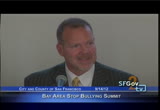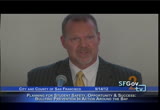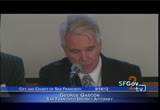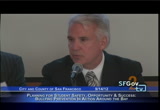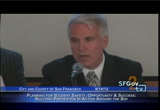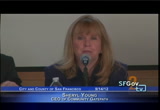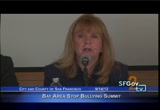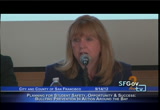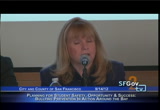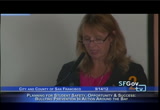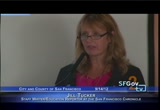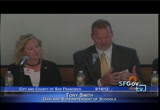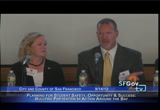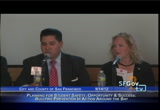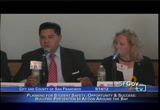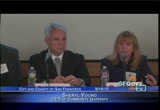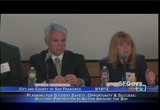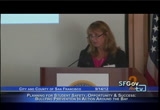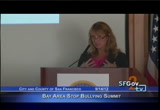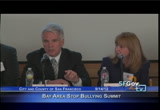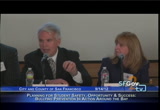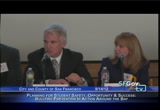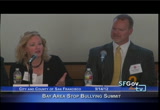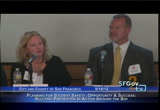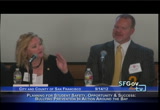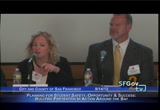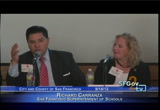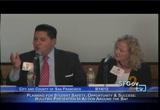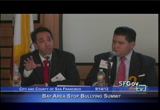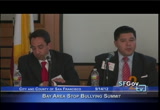tv [untitled] April 18, 2013 4:44am-5:14am PDT
4:44 am
that we would in fact keep our worth's intact while the others is intact and the highest inspiration and live that in stated value and change the practices around social emotional learning and embed in the city of oakland that we belong to each other and i tell you what when so many of the students have been murdered over the last three and a half years i have been there and up to 85 homicides in the city this year it is a place and space of despair and lack of hope. i have tremendous respect for our law enforce .. we have been doing restorative justice work with the police department and with the teachers. people are saying enough is enough and i have in fact have to change to seek transformation. i mean we have to -- the saying cornell
4:45 am
west that justice is the public face of love. if in fact we want that to be true we have to be just with one another and i think that's what we're trying to do in oakland. [applause] >> district attorney. >> well first of all i would like to thank you for putting this together. i also want to thank katie miller and rebecca from my office and consistently at the forefront and in the community and common sense media who became a partner last year and katie and her people and rebecca and the school district we started public information a year ago and my partner richard carranza who is an incredible superintendent, someone i am proud to work with. first of all let me tell you that bullying takes many different
4:46 am
shapes. it can be physical, it can be emotional, it can be verbal. i can tell you having been a non english speaking student and immigrant early on and quite frankly times that were very different that we were bullied all the time and didn't know it was bullying and right to the point i actually dropped out of school, and i think it's also important to recognize it's not kids on kids and sometimes adults are part of it, and sometimes unfortunately staff members are part of it. i remember being accused early on by a science teacher and told i was using lsd and i didn't know what it was at the time. i was in the class for three months and didn't work english and the teacher didn't realize i didn't speak english and there was only 20 in the classroom and bullying can take different shapes and
4:47 am
not paying attention and caring and while we're focusing on what kids are doing to each other, we must not ignore that sometimes adults can be part of the problem just by their behavior, even by the way they look the other way. i agree with richard 100% that we need to deal with this but zero tolerance has to be articulated in a very different way. 36% of kids that are bullied everyday report not coming to school. there is another piece that is important. as a member of the justice center we did intensive study of school discipline last year and looked at a million roashds and 60% that are disciplined incredibly more likely to drop out of school and end up in the criminal justice system and while we are working with the victims and educating we are working with all of the kids
4:48 am
and we want the kids to have a healthy environment when they're in school, and not only when in school but as they become a citizen and progress through their life. i am proud to being here. our office is very committed to doing this and fortunate and we got a couple of grants announced and working on restorative justice with the schools and did it with adults and this is a wonderful opportunity. thank you very much for putting this together. [applause] >> thank you. cheryl. >> great thank you. it's wonderful to be here today. i am actually wearing two hats. one i am representing for our area we have an anti-bullying campaign we launched, a two year program through the superintendent of the schools in san mateo county and also as the director of community gate
4:49 am
paths and serves children and adults with disabilities and how i got involved with this two years ago we have a website, online social networking cite site that a lot of parents participate in to get information and professionals and networking and sharing stories with each other and two years ago in the fall we heard parents complaining about kids with special needs and the bullying going on in the schools and the lack of response from the schools to the issues. there was starting to concerns about facebook and cyber bullying so we were going to put together basically a paper. that paper turned out to be a report. walk a mile in their shoes through the stories we heard across the nation what were just gut wrenching with kids with special needs and the crutches were knocked out from
4:50 am
under them and one girl tried to jump out a window to get away from the group bullying her. one of the kids and drinks spiked with alcohol everyday at school up to the point he was hospitalized and almost died and poisoning to another child that was forced to eat dog food on the play ground during lunchtime, so these horrible stories. we put together the report and started really giving a voice to children who had been bullied as well as their families and this was an area that wasn't really talked b as a result of that we were invited to the federal summit a year ago in washington dc, and i have to tell you after sitting and hearing a day of stories of all of our children i came away with just something in my stomach that just couldn't let it go.
4:51 am
that, this was something that ready had to be addressed and this what was i was going to focus on. at the time we were trying to pursue some federal legislation to protect children with special needs. that wasn't going anywhere. as i heard in the federal summit and heard the issues around the definition of bullying, concerns about policies and procedures, seemed like a lot of people blaming everyone. parents blaming schools and schools blaming parents. there seemed to be a lot of confusion and noise out there and i will never forget at the last session secretary duncan got up and said "this issue is really a very complex issue, and the only way it's going to get addressed is back in your community". well, i took that to heart because i realized that's what needed to be done, and that's why i came
4:52 am
back to san mateo county and have gathered other like minded people and what we can do over the next two years and address this issue and put in place the measures that need to be done to make our environment safe because we know that bullying doesn't just happen in the schools. it happens all throughout our community. >> thank you. [applause] >> i get a lot of emails and press releases and it was interesting yesterday morning i went and saw the movie "bully" with the kids in san francisco and over the course of the rest of the day i got and maybe a few days before that at least three emails, press releases, with adults accusing each other of being a bully. in one case it
4:53 am
was folks accusing a superintendent of being a bully for imposing budget cuts. another one it was a principal who was a bully because she was tough on teachers at the school. i hear politicians calling each other bullies on the campaign trail. when i watched the film yesterday it broke my heart that alex who was completely experiencing what a bully really felt like to have these people throwing this word around lightly, politically, for press attention. and i want to go back and talk about bullying. i think people addressed it in their minds what bullying is, but i want to ask you what is bullying? how did that differ or where is it on the spectrum
4:54 am
of behavioral issues? is there a point where you say this is bullying? and when do you step in and take action for what would be bullying or what is just a classroom management issue or behavioral issue? i would like to see if you could differentiate just a little bit about when you see intervention most effective for this thing that alex called bullying? >> as mandated reporters for sexual abuse but where is the mandated reporting for this type of abuse and stand for it and
4:55 am
call out? i think the notion of the restorative frame and it's a reporture of a relationship and until such time we start talking about caring school communities and any of the ded greidation of other is limiting is a power differential and damaging the other we haven't taken on the notion of bullying in the way we need to and growing the social emotional well being of the young adults and quite frankly adults are -- we all know are totally compliitd and sometimes just afraid and don't know how to intervene and know enough so we have taken more time and are going to take more time to increase the capacity of the adults and to differentiate and feel more comfortable and i will tell you across race, across class -- maybe that's the way they do it. as an educator,
4:56 am
can i? and as a responsibility we have to get power and empowering adults what they can do and the responsibilities are and to name discrete actions and this is bullying and this isn't and it's a much bigger frame about children and adults being safe and being fully present and we're are taking that on as a system and until that time we have done that i don't think we're going to see the real outcomes that we need that are focused ready to engage in communities the way that we need to. i can't give you this is bullying. this isn't. we're making progress in able to talk about it. >> richard. >> i agree everything tony said and as a teacher and administrator and i have children in the san francisco public schools to and this is about the power relationship that one individual has over
4:57 am
another individual and the district attorney spoke about sometimes adults are part of the issue where an adult that holds the ability to give you a grade for example and you're a senior and you need a certain grade to get into a certain college that is inhere endly a power relationship, and to utilize that relationship to get certain actions out of a student or hold certain students accountable i think is what tony is talking about. it's not a healthy relationship and it's issues of power and about relationships. how do you develop relationships that are respectful? it reminds of the term "social justice". we think we know what we mean by it but i can't tell you the emails i get from individuals. >> if "if you don't get me in the school i want to you're denying
4:58 am
me social justice" and it's usurping of the teerm and let's call bullying what it is and assault and make it clear to what it is and make it clear to other individuals and there are other grades and issues of classroom management and it's okay and let's get focused and ready to go on the lesson, but when you're talking about hurting somebody's feelings that is often times in my experience been an issue of power. >> yeah, i would like to add to that. i think there has been dialogue in the nation throughout the issue in the last year, and when you look at recent report that the federal department of education presented basically has the definition of bullying in every single state and also a list of i think 37 components and ranks that show you state by state
4:59 am
which ones include those components of it. as we heard earlier the federal department is close to approving a federal definition of bullying, so i do believe there is a lot of work in this area. i also think there is a lot of work going on in terms of evidence based practices in terms of interventions that is very exciting. some of the information that we know is that about 80% of the bullying that goes on can pretty much be handled by some very prescribed ways of dealing with things. 20% requires really very targeted social emotional behavioral approach and i think that as we get better at that knowing what methods work with which kids we're going to come a
5:00 am
long ways in terms of the interventions and then being successful with those. >> thank you. >> a lot of folks talked about the culture of a school and improving the culture of a school. when i was doing background research on bullying one thing that came to mind was sort of the differences in different cultures which could be in two different schools in the same city about who the victims of bullying might be and the hot shots in each of the schools, so for example research showed that the social attitudes within a particular setting and the community and the parents can manifest themselves in terms of who folks are picking out to target; right? so for example at maybe a high end school like lowell ore gunn you might have bullying because you're not taking enough ap class. i have
5:01 am
heard this and there is so mush pressure and criticized by the peers if they're not smart enough. in other schools it's the opposite and bullied because they are smart when that is not the krult. maybe in texas where it's a different culture that we saw in the movie that perhaps football is everything and if a child isn't good at sports they're an outcast. i would like to ask how or if addressing the cultural needs at each school how can we -- is this all one way of doing this, or do you feel there are different needs in different communities? and i think perhaps the law enforcement folks feel the cultures in the communities and see that come out in the adults. i would like to hear about how do you affect a culture and
5:02 am
even in san francisco we have many cultures affecting what is valued, what is criticized. >> you know i think that richard touched upon this. it's a relationship of power and it's clearly going to differ from community to community; right. when i was telling you i was picked because because i didn't speak english or at all initially there were only about 5% of us that were hispanic in the school and wouldn't be the case if 95% are hispanic and english speaking as a second language, but i think the way that we can deal with the issue is we ought to first of all start with the notion of respect for others, and respect for others can work across the line. it doesn't necessarily mean -- it doesn'tly has to deal with the culture. is how we treat one another? and i think we
5:03 am
have to be very clear in our educational process and the communication to our people and what is acceptable behavior and what is unacceptable behavior, and i am often fearful when we try to develop a black letter law if you have all these factors and bullying and you fell outside and that works okay in the courtroom. right? as prosecutors we need clear understanding of the laws to understand whether we have a criminal violation or not, but i am fearful we maybe overly legalistic and the way we deal with on a daily basis and we need to approach this by a global perspective respecting people and understanding we have the same rights and obligations and starting with the adults and i go back to the adults because the adults really have to tow the line here. they really have to walk the talk. i cannot tell you how often i of involved in large mentoring efforts and now in two different places, in
5:04 am
l.a. and arizona. i cannot tell you how often the teachers are the ones that set the tone whether we have a respectable environment or and not part of that is education and we have to educate the adults that spend time with the kids and the federal government will come up with the giens and 37 factors or 40 and frankly most of us won't remember and unless we're prosecuting and looking for the elements of the crime and whether we're going to file a case or not. i i think we need to be more global than this and this works and we need to illustrate the things that aren't acceptable? what is the impact on the victim? what is the impact on everyone else? and working together to solve the problem. >> nancy. >> in some school districts and teachers when i brought up this issue i get back "you're not
5:05 am
going to change kids being kids. some kids will pick on other kids and in the dynamic girls will be friends today and the queen bee will turn away from some girl and the enemy today and tomorrow it's somebody else, and again i agree with george and so much of this is the responsibilities falls on those adults who actually have a bird's eye ore worm's eye view of what is going on in the schools and the kids' lives and when kids don't show up for school and do more inquiry we find there is an issue around sexual harassment in the school and another form of bullying and girls assaulted or harassed in an aggressive way, or and it just goes higher and higher. our teachers need to be not only recognize what they're seeing
5:06 am
but willing to look at what they're seeing and one of the unfortunate things we have seen with some teachers and i am not criticizing the teachers in general because i think this is a learning process for adults also to move from kids will be kids and we had someone who was mean to us in school to actual bullying, but we have talked to the school districts around the state and sometimes the teachers have the blind's eye and it's more work to get involved and more work and what do relationships look like, and i agree with tony this is the beginning of relationship building, or it's a relationship going bad that could get worse. and so i think that we have a lot of educating to do. in my office we do a lot of cyber bullying training in our schools and it's amazing how much access some kids have to the internet at a really young age. they
5:07 am
have iphones. they're on the internet. they have or smartphones. they have computers in the bedroom and parent it is never over the shoulder to see what is going online. there is a lot of unrestricted access to the internet and the internet has put it on another level and one push of a button and everybody in the school will have a picture or hear it and the outcome of that is -- it would be not just reconciling relationships or restorative justice or some other way between two or three or four people but now you have a whole study body that has been tempered or tainted with something that goes against the individual who was a target of that, so the internet working
5:08 am
more strongly with the partners and the providers of the internet and there is awareness and education, but back to the student assemblies that we do it is amazing at the end of the assemblies how many kids will step forward quietly or privately "it happened to me. it happened on the internet. this person put something out about me" and didn't feel they had a place to go so there could be intervention so i think the partnership between law enforcement and between the schools and the school resource officers is critically important. we have prosecuted parents by the way who have encouraged their children to bully in a dramatic way. we prosecuted a mother who forced the 14 year old daughter to bully a 12 year old and resulted in the 14 year old physically attacking the girl with the mother screaming at her if she
5:09 am
didn't continue to beat the kid she was going to get beaten and the kids watching were filming it on their smartphones and that girl -- the daughter was also a victim of bullying by her own mother and i think this is a place where law enforcement can step in and hold parents accountable and doing things aggressive or against the law and encourage the kids to do something against the law and getting the parent's intention and bring them in on some level. >> quickly i want to say something about this. i appreciate what you have said about the adults and the adults having responsibility but i'm going to speak practical callity. i have been a teacher and principal in different states. i want you to think about to the time after columbine and think what happened after that incident
5:10 am
happened. there was a wave to put metal detectors in schools and all of this security. i will tell you folks in two different schools and having confiscated many weapons it wasn't a metal detector that brought it to my attention. it was a student. they were the most effective because they're ubiquitous. they are everywhere. they know who has what in the backpack and if you extrapolate that to bullying we can't be at home when they are logging in. students will know who posted what and if we can build the resiliency in the student body and move from the paradigm where it's okay to post those things and you're a big guy because you have a picture of a naked teeneen on your phone and to a culture it's not
5:11 am
scpook you're hurting somebody and somebody will bring that to the attention of an adult that can intercede. i think that is what we're trying to develop and system and students understand it's not okay to hurt each other and whether it's words or pictures. that can only happen with what george and nancy were talking about and empowering teachers and administrators and parents to be part of that conversation as well. >> thanks richard. >> i want to add -- >> really fast. >> thank god there are people that want to teach in our schools and i think it's a tremendously difficult and challenging job and as res lynn was talking about when you have the five minutes passing in the hall and you see bullying so you have a few choices. i would like to go to the bathroom. i can do this. i can do that, or am i going to get involved in
5:12 am
this situation? and to give some strength to encourage teachers to do this, there was a law passed recently. assembly bill nine and amends the education code and requires school personnel, whether it's teachers or administrators if they see something that looks bullying they are required to intervene when it's safe and appropriate to do so, i think it's the kind of law that is trying to give teachers -- yeah, you are the authority figure. you are supposed to do this and we will support your efforts. assembly bill nine and amends the education code and it's just something that might be useful for the school personnel here. >> okay. we have time for just a couple of questions but before that i'm going to ask you a panel and you only get three words to answer. i'm going to cut you off. you can use one
5:13 am
word. money is a problem in terms of programs. if you had all the money in the world what would you do to combat bullying? >> kids, empower, empower kids. >> okay. can specific. >> education and prevention. >> restorative justice and healing. >> that's too many words. nancy. >> healing and intervengdz. >> developing deep relationships. >> strengthening families. >> excellent. [applause] thank you to the panelists. we have time for about two questions. >> hi to the panel and thank you very much. really in
52 Views
IN COLLECTIONS
SFGTV2: San Francisco Government Television Television Archive
Television Archive  Television Archive News Search Service
Television Archive News Search Service 
Uploaded by TV Archive on

 Live Music Archive
Live Music Archive Librivox Free Audio
Librivox Free Audio Metropolitan Museum
Metropolitan Museum Cleveland Museum of Art
Cleveland Museum of Art Internet Arcade
Internet Arcade Console Living Room
Console Living Room Books to Borrow
Books to Borrow Open Library
Open Library TV News
TV News Understanding 9/11
Understanding 9/11